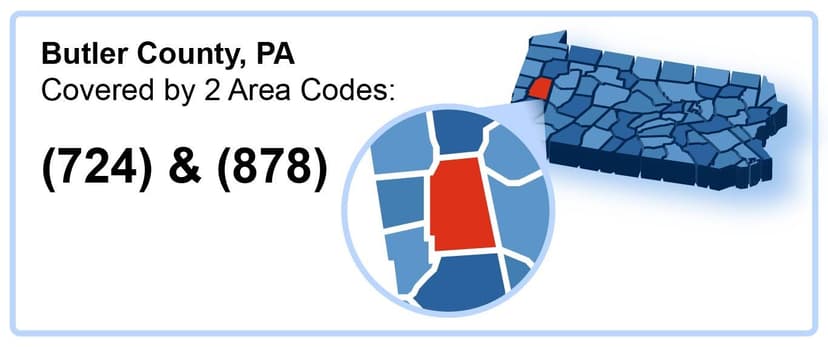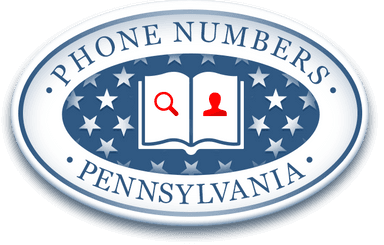What are Butler County Area Codes?

The North American Numbering Plan, created in 1940, divides North America into numbering plan areas. These numbering plan areas are then encoded with three-digit number prefixes known as area codes. The North American Numbering Plan Administrator handles the allocation of all area codes in North America. The Pennsylvania Utilities Commission is charged with ensuring safe and reliable telecommunications services within the State of Pennsylvania.
Area Code 724
The area code 724 was created from a split of the 412 area code. The area code 724 was officially brought into service on the 2nd of January, 1998. This area code serves many suburban areas around Pittsburgh. Some of which include McCandless Township and New Castle.
Area Code 878
The area code 878 was officially brought into service on the 17th of August 2001 and is a service overlay for area codes 412 and 724. The area code 878 serves the Pittsburgh Metropolitan Area, including several cities, towns, and communities like Bethel Park, Mount Lebanon, and Penn Hills.
What are the Best Cell Phone Plans in Butler County?
A 2018 survey conducted by the National Center of Health Statistics highlighted the prevalence of wireless phones amongst residents of the State of Pennsylvania. The survey showed that 43.4% of adults in the State of Pennsylvania used wireless phones exclusively. This was significantly greater than the 4.3% of adults in the state who relied solely on landlines. The study also indicated that 21.1% of adults in the State of Pennsylvania used both wireless phone services and traditional landlines. Similarly, the preference for wireless phone services is evident among minors in the State of Pennsylvania. The study showed that 52.5% of minors used wireless phone services exclusively. This is significantly larger when compared to the 2.4% of minors who used landlines exclusively and the 14.5% who used both landlines and wireless phones.
Verizon covers 90% coverage, making it the service provider with the widest coverage in the county. Sprint and T-Mobile follow closely, covering 86% and 84% of the county, respectively. AT&T covers only 70% of the county. However, in terms of phone service plans, these four carriers offer a wide range of service plans to suit residents' preferences. The service plan options available to residents of the county are flexible to suit their needs. Note that these service plans allow Butler County residents the flexibility to choose between data and talk time.
In terms of data transfer speeds and 4G data services, the four major service providers in the county all provide above-average 4G data reliability. However, Verizon provides the most reliable 4G service in the county, with 94.2% uptime. This is closely followed by T-Mobile with 94% 4G service uptime. Finally, AT&T and Sprint also have 4G uptime of 88.9% and 88.4%, respectively.
The evolution of modern telephony services is driven by the need to a balance between cost, reliability, and flexibility. This has led to the increased number of Butler County residents and businesses that leverage the use of Voice over Internet Protocol (VoIP). VoIP is a telephony technology that converts voice signals into digital signals before they are transmitted. Therefore, making them more reliable for transmission purposes. achieve
What are Butler County Phone Scams?
Butler County phone scams target Butler County residents. In these scams, the fraudsters use telecommunications products and services to defraud county residents. The goal of the fraudsters is to obtain money, financial details, and other personal details from county residents. The fraudsters use phone calls, text messages, robocalls, and emails to reach Butler County residents. Often, these fraudsters use Caller ID spoofing to hide their phone numbers. County residents can use services like free reverse phone lookup to uncover spoofed Caller IDs.
What are Butler County Sheriff’s Impersonation Scams?
In the sheriff impersonation scam, the fraudster uses Caller ID spoofing to make their phone number appear like a legitimate Butler County Sheriff’s Office phone number. The fraudster then calls the victim and informs them of an unpaid fine or outstanding arrest warrant for their arrest. The fraudster will use threats and intimidation to extort money from the victim. They demand that the victim makes payment with a gift card or a prepaid debit card. The Butler County Sheriff's Office has informed county residents that the Sheriff’s Office will never call to demand any payment over the phone. They also advised that residents hang up from such calls immediately and call the verified phone number of the Sheriff's Office. This can be gotten from the Sheriff's Office’s official website.
What are Butler County Tech Support Scams?
In tech support scams, fraudsters use calls and online ads with security alerts to deceive Butler County residents. These alerts or calls often inform residents that their computer systems have been compromised and exposed to security risks. Residents of Butler County are advised to ignore such ads, as fraudsters often use them to gain unauthorized access to residents’ systems. Sometimes the fraudsters call the residents, telling them of new security threats that their systems are exposed to. The fraudsters then request residents’ passwords to gain access to their systems to help mitigate the threats. Senior citizens are more susceptible to this scam. Butler County officials have advised residents to assist in constantly educating senior citizens on these scams to prevent them from falling victim. Residents can leverage services like phone number searches to find out who the phone number belongs to.
What are Butler County Social Security Scams?
In social security scams, fraudsters use caller ID spoofing techniques to make their numbers appear like legitimate phone numbers of the Social Security Administration. During these calls, fraudsters inform their victims that their social security numbers were used to commit fraud or launder money. The fraudsters then threaten to take legal actions against their victims or get them arrested if they do not make certain payments. They also go further to request personal information from their victims. Residents may use free reverse phone lookup to mitigate Caller ID spoofing and identify who called.
What are Robocalls and Spam Calls?
Robocalls are unsolicited automated phone calls that make use of programmed auto dialers to deliver pre-recorded messages. Political campaigns, telemarketers, and polling companies often use robocalls to reach out to many individuals in a short time. The Telephone Consumer Protection Act (TCPA) places restrictions on the use of robocalls. The act thereby designates some robocalls as illegal because they violate the private and public safety interests of telephone subscribers. Illegal robocalls refer to calls from telemarketers and some private businesses who have not obtained prior consent from county residents to call them. However, calls from tax-exempt nonprofits, polling companies, and political campaigns are considered legal robocalls, as the TCPA permits these calls to be made without prior consent. However, spam calls, on the other hand, are unwanted and unsolicited communications that are often distributed in bulk. Spam calls are illegal and frustrating.
Fraudsters leverage the use of spam calls and robocalls to defraud residents of Butler County. These fraudsters often spoof caller IDs to hide their real identities. This further complicates residents' ability to identify such spam calls or robocalls. Butler County residents are advised to take the following actions when dealing with robocalls and spam calls:
- Residents should use call-blocking tools to block all unwanted robocalls and spam calls.
- Residents should register their phone numbers on the National Do Not Call Registry. They may also register on the Pennsylvania Do Not Call List. This drastically reduces the number of spam or robocalls they receive.
- Residents should not pick up calls from unknown numbers. However, if they pick and discover it is a robocall, they should hang up immediately.
- Residents may report unwanted robocalls to the Federal Trade Commission (FTC).
- Residents should use good reverse lookup services to identify who called.
How Can You Spot and Report Butler County Phone Scams?
Fraudsters are continuously devising new and more sophisticated ways to defraud residents of Butler County. This trend is driven by technological advancements that have led to the creation of robocalls and caller ID spoofing technologies. However, while fraudsters are leveraging technology to commit these scams, residents can leverage technologies and services. They can use reverse phone number lookup by address to know the origin of a call and reverse cell phone lookup to know who called. While it is generally acknowledged that technology can be used to combat phone scams, residents are also advised to familiarize themselves with ways to identify these phone scams.
To identify a scam, here are some indicators a Butler County resident should look out for:
- The tone of the conversation becomes aggressive once the resident starts asking relevant questions to uncover details of the call. The caller then uses threats in an attempt to intimidate the resident.
- The caller is keen to obtain the resident’s details at all costs. They will often try to guide the resident through some identity verification process during the call, using phrases like “kindly verify your identity.” Legitimate organizations or government agencies will never request personal details over the phone.
- The caller claims to be from a legitimate organization but requests that payment is made in gift cards or other unconventional methods. Residents need to note that legitimate businesses will never request payments to be made through alternate payment channels.
- The call often begins with a long pause or a pre-recorded message; this is very common with robocalls. After that, a human voice may be heard continuing the conversations.
- The caller pressurizes the resident to make a decision on an offer without allowing them to properly evaluate the offer.
- The caller offers an amazing investment opportunity with incredible returns on investment. Note that if an offer is too good to be true, then it is most likely fraud.
However, for residents that are unable to identify some of these indicators and eventually fall victim to these scams, various agencies are available to receive their complaints. These agencies include:
The Pennsylvania Attorney General’s Office - Phone scams, robocalls, spam calls, and consumer-related complaints can be reported online or in person at:
Pennsylvania Office of Attorney General
Bureau of Consumer Protection
Strawberry Square, 15th Floor
Harrisburg, PA 17120
Monday - Friday 8am -5pm
Phone: (717) 787-3391 or (888) 777-3406 (Toll-Free Helpline)
The Butler County Sheriff’s Office - Reports of phone scams can be made in person at:
The Butler County Sheriff’s Office
First Floor, County Courthouse
300 S Main Street
Butler, PA 16001.
The Office of the State Inspector General - All fraud-related cases can be reported online and in-person at:
The Office of the State Inspector General
Bureau of Fraud Prevention and Prosecution
555 Walnut Street 8th Floor
Harrisburg, PA 17107
Phone: 1 (855)-Fraud PA or (717) 772-4935
Federal Communications Commission (FCC) - Regulates communications in the United States. Residents can report consumer complaints about illegal robocalls and caller ID spoofing online.
FBI Internet Crime Complaint Center - Residents can report cases of phone and internet fraud online to the FBI.
Federal Trade Commission (FTC) - The FTC deals with complaints of phone scams and identity fraud online. Complaints may also be made via phone at 1-877-ID-Theft and 1-877-FTC-HELP.
